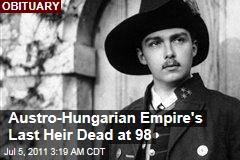 Death of a Emperor-Manque
Death of a Emperor-Manque
Geoffrey Wheatcroft wrote a long and masterful history of the Habsburg Dynasty which I finished reading about a year ago. My interest in HapsburgMitteleuropa has always been sustained by Robert Musil's book A Man Without Qualities, a sort of Proustian meditation on the "fictional" author of a supposed "0fficial" biography of the Hapsburg family and the 650th Anniversary of the foundation of what later became the Austro-Hungarian Empire. Musil has always been somewhat underappreciated.
My own reference to the Archduke Otto was that when only a young six-year old or so, I happened to "meet" this august personage in theMotherhouse of the School Sisters of Notre Dame of Milwaukee Province, located in Elm Grove, a leafy western suburb of Milwaukee where my Catholic grade school was located, just across the street from the imposing Victorian pile. I have a vague memory as the tallest and "smartest" first-grader in St. Mary's Elementary School of being among a few of the kids in the school to shake hands with the Prince, who counted the SSND as among the recipients of the patronage of his Hapsburg heritage, such as it was.
Later, in the Dept. of State, I learned of the minor, but somewhat influential role he played in attempting to set up a postwar European Christian Democratic Party, then beset by Cold War pressures. Subsequently, two decades later at St. Louis University, I met Kurt von Schuschnigg. the Austrian Premier evicted or suborned by Hitler's Anschluss in the Putsch of 1938. A decade after that, as an FSO I sat in conversation with Ambassador Neumann, freshly back from Afghanistan, who as a youthful student in Vienna in the thirties was a young socialist and asked him whether he'd ever crossed paths with Von Schuschnigg and he replied: "Yes, he had me sent to Dachau."
Talk about a conversation-stopping moment...!!! Anyway, the obituary of the Telegraph says:
Otto reached his 18th birthday and was duly declared, in a family ceremony with few outside guests, “in his own right sovereign and head of the house”.
However ghostly that title appeared, it was enough to impress the Austrian-born Adolf Hitler, who was manoeuvring to seize power in Germany. When in the winter of 1931-32 the young Pretender spent a few months studying in Berlin Hitler twice suggested a meeting.
The first invitation came from Prince August Wilhelm of Prussia, the dim-witted Nazi son of the exiled Kaiser, and the second via Goering himself. Otto refused both times on the spurious excuse that he had not come to Berlin to discuss politics (in fact, he was doing nothing but). Hitler was incensed by the snub and it touched off a six-year battle between the two men for the fate of their Austrian homeland.
The climax was reached in February and March of 1938 when a Nazi takeover in Vienna seemed imminent, prompting a short-lived show of defiance from the Austrian Chancellor Kurt Schuschnigg — a monarchist at heart but without the strength of his convictions. His vacillation prompted a remarkably courageous offer from the young Pretender to return from exile to take over the reins of government in order to repel Hitler. Schuschnigg dithered but eventually rejected the idea — perhaps just as well for Otto, who was already high on the Gestapo’s wanted list.
Otto Von Hapsburg was one of the few survivors of a bygone age who managed to retain the Christian values of his long dynastic pedigree, and was most gratified when in 2004, his unhappy father Karl was beatified by Pope John Paul II. His son Karl had lost any political career possibilities because of a campaign funding scandal and although Otto remained a representative for Western Austria in the European Pariliament in Strasbourg, his death has ended the long participation of the Hapsburg Family in European political affairs.



No comments :
Post a Comment